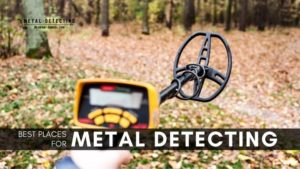A metal detector can be used to help find many items such as car keys, loose change, and even buried wiring. It can also be used to detect weapons and dangerous devices at airports and security checkpoints. But can it detect drugs?
In this article, we will find out if a metal detector can be used to detect drugs.
Before we begin, let’s talk about what exactly a metal detector does.
How Does a Metal Detector Work?
Metal detectors are designed specifically to locate metallic objects or objects that contain metallic elements. They can detect objects hidden within other materials or even underground.
All metal detectors usually consist of a control box attached to a coil at the end of a long rod or handle. The coil emits an alternating electrical current (AC) which, when passed over the ground or object, induces a secondary AC current in metal objects. The magnetic field created by this induced current is concentrated in the immediate area around the metal object.
The strength of this magnetic field can be measured using a metal detector. Since there are magnets inside the control box, the strength of this magnetic field is directly proportional to how close the object is to the coil.
A detector can be anything from a simple hand-held wand to airport scanners you can walk through.
Can a Metal Detector Detect Drugs?
Drugs that are organic such as marijuana and weed will not set off a metal detector. However, if they are hidden in a metal container or a glass jar that has a metal lid the detector will definitely give a reading.
Other hard drugs such as cocaine, heroin, or methamphetamine also don’t contain any metal and will not set off a metal detector. Unless they have been wrapped in aluminum foil, they must be found by other means such as drug-sniffing dog, atomizer, or x-ray.
Can a Metal Detector Detect Drugs in a Vape?
Metal detectors are able to detect metals inside a vape regardless of whether or not it contains weed or any other type of drug. All vape devices have internal wiring, batteries, and occasionally a metal outer shell.
Most vape devices are used for smoking legal substances like nicotine and medicinal cannabis. However, if you plan on traveling with your vape, make sure you check your destination’s laws and regulations before heading out. Trace amounts of an illegal drug on your vaping device may get you in trouble with the law!
Can Metal Detectors Detect Drugs Inside the Body?
Metal detectors are not designed to detect drugs inside the human body. This includes detector wands and walk-through scanners. They will only react to metals on the outside of the body.
The only way for a metal detector to work inside your body is if it is coupled with an x-ray or computed tomography scan (CT). A CT scanner combined with a metal detector can detect metals deep inside the human body.
But usually, no one uses these types of scans when examining a person’s body for drugs. There are other more practical, faster scans that doctors and law enforcement use to detect the presence of drugs in a person’s system.
Can Metal Detectors Find Drugs at Checkpoints?
Metal detectors are not very useful at detecting drugs during security checkpoints. Law enforcement officers may use metal detectors outside or at events that they suspect might be drug trafficking areas to look for concealed weapons.
Metal detectors alone will not work to detect drugs at checkpoints unless coupled with an x-ray scanner or drug-sniffing dog.
How are Drugs Detected?
Customs and law enforcement agencies have historically used several methods to detect drugs from being smuggled into and out of a country. Below are the most common methods used:
Drug Sniffing Dogs:
Customs and law enforcement agencies train dogs to detect the scents of substances such as heroin, cocaine, methamphetamine, cannabis/marijuana, ecstasy, etc. They are trained to sit whenever drugs are detected so they can be removed from the area or the entire vehicle is searched for more contraband.
A dog’s sense of smell is extremely sensitive and can detect scents from many meters away. It is about 40 times stronger than that of humans.
X-Ray Machines:
Scanners such as those found at airports can detect dense and metallic materials like knives, guns, and drugs inside a passenger’s luggage or carry-on bag. They cannot however determine the type of drug.
For this reason, more sophisticated scanners that can detect specific drug types are used once the substances are found in the X-ray. These scanners can detect which drug it is by having databases of chemical compound densities for each known illicit substance.
Particle Atomizer:
The ion mobility spectrometer is used in airports to detect explosives and drugs. It separates different compounds or elements by “mass” so they can be easily identified. The technology has been available since the 1980s but was not made popular until recent years when it was commercialized for widespread use.
Airport security has upgraded its technology to increase accuracy. Originally, they could only detect harmful substances in powder form but are now able to detect liquids, gels, and aerosols.
Mass Spectrometer:
Mass spectrometers can detect different chemical compounds. They are mostly used in hospitals, laboratories, and airports to determine a patient’s disease or what drugs a person has consumed.
This machine works by ionizing a sample of air or gas from the subject being checked. Ionized particles have an electrical charge which allows them to be separated by mass according to their ion mobility spectrometers.
Final Thoughts
Metal detectors can be used to detect metal-containing objects such as weapons and other dangerous devices. However, they cannot be used to pick up on organic material such as drugs because they don’t contain any metal and will not set off a signal.
Metal detectors are only effective at detecting drugs when paired with other technologies such as X-ray scanners, drug-sniffing dogs, or particle atomizers.

